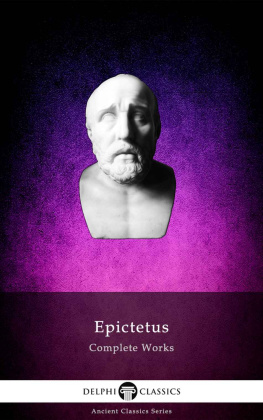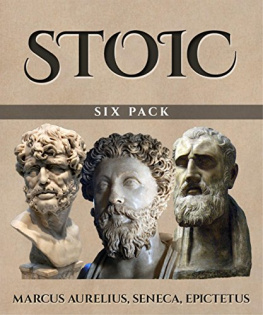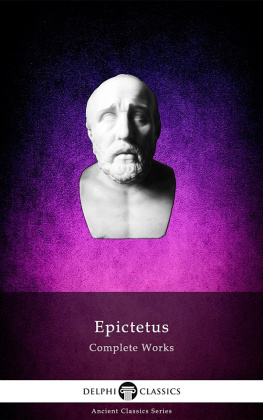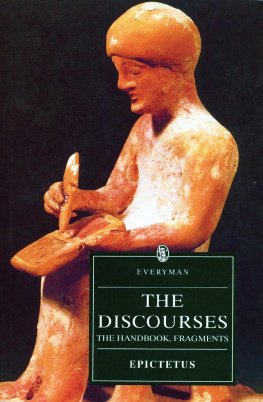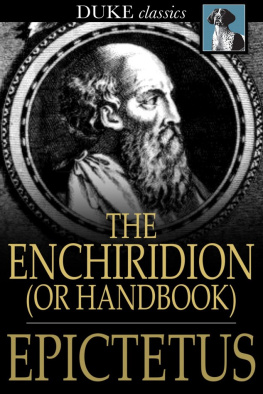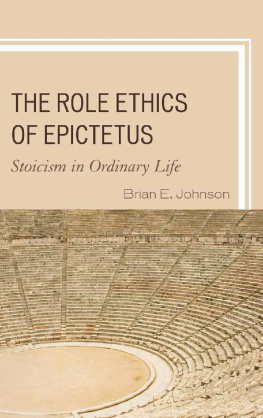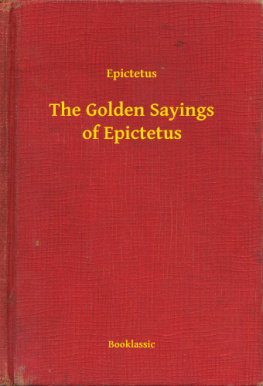Courage Under Fire
Testing Epictetuss Doctrines in a Laboratory of Human Behavior
James Bond Stockdale
Hoover Institution on War, Revolution and Peace
Stanford University
1993
The Hoover Institution on War, Revolution and Peace, founded at Stanford University in 1919 by Herbert Hoover, who went on to become the thirty-first president of the United States, is an interdisciplinary research center for advanced study on domestic and international affairs. The views expressed in its publications are entirely those of the authors and do not necessarily reflect the views of the staff, officers, or Board of Overseers of the Hoover Institution.
Hoover Essays No. 6
Copyright 1993 by the Board of Trustees of the Leland Stanford Junior University
All rights reserved. No part of this publication may be reproduced, stored in a retrieval system, or transmitted in any form or by any means, electronic, mechanical, photocopying, recording, or otherwise, without written permission of the publisher.
First printing, 1993
Manufactured in the United States of America
15 14 13 12 11 10 13 12 11 10 9 8
Library of Congress Cataloging-in-Publication Data
Stockdale, James B.
Courage under fire : testing Epictetuss doctrines in a laboratory of human behavior / James Bond Stockdale.
p. cm. (Hoover essays no. 6)
ISBN-13: 978-0-8179-3692-1 (pbk.: alk. paper)
ISBN-10: 0-8179-3692-0 (pbk.: alk. paper)
ISBN: 978-0-8179-3693-8 (electronic)
1. Vietnamese Conflict, 19611975Prisoners and prisons, North Vietnamese. 2. Vietnamese Conflict, 19611975Personal narratives, American. 3. Stockdale, James B. 4. Epictetus. 5. Prisoners of warUnited StatesBiography. 6. Prisoners of warVietnamBiography. I. Title. II. Series: Hoover essays (Stanford, Calif.: 1992); no. 6.
DS559.4.S74 1993
959.70437dc20 93-42455
CIP
COURAGE UNDER FIRE
Testing Epictetuss Doctrines in a Laboratory of Human Behavior
James Bond Stockdale
Speech delivered at the Great Hall, Kings College, London, Monday, November 15, 1993.
I came to the philosophic life as a thirty-eight-year-old naval pilot in grad school at Stanford University. I had been in the navy for twenty years and scarcely ever out of a cockpit. In 1962, I began my second year of studying international relations so I could become a strategic planner in the Pentagon. But my heart wasnt in it. I had yet to be inspired at Stanford and saw myself as just processing tedious material about how nations organized and governed themselves. I was too old for that. I knew how political systems operated; I had been beating systems for years.
Then, in what we call a feel out pass in stunt flying, I cruised into Stanfords philosophy corner one winter morning. I was gray-haired and in civilian clothes. A voice boomed out of an office, Can I help you? The speaker was Philip Rhinelander, dean of Humanities and Sciences, who taught Philosophy 6: The Problems of Good and Evil.
At first he thought I was a professor, but we soon found common ground in the navy because hed served in World War II. Within fifteen minutes wed agreed that I would enter his two-term course in the middle, and to make up for my lack of background, I would meet him for an hour a week for a private tutorial in the study of his campus home.
Phil Rhinelander opened my eyes. In that study it all happened for memy inspiration, my dedication to the philosophic life. From then on, I was out of international relationsI already had enough credits for the mastersand into philosophy. We went from Job to Socrates to Aristotle to Descartes. And then on to Kant, Hume, Dostoyevsky, Camus. All the while, Rhinelander was psyching me out, trying to figure out what I was seeking. He thought my interest in Humes Dialogues Concerning Natural Religion was quite interesting. On my last session, he reached high in his wall of books and brought down a copy of The Enchiridion. He said, I think youll be interested in this.
Enchiridion means ready at hand. In other words, its a hand book. Rhinelander explained that its author, Epictetus, was a very unusual man of intelligence and sensitivity, who gleaned wisdom rather than bitterness from his early firsthand exposure to extreme cruelty and firsthand observations of the abuse of power and self-indulgent debauchery.
Epictetus was born a slave in about A.D. 50 and grew up in Asia Minor speaking the Greek language of his slave mother. At the age of fifteen or so, he was loaded off to Rome in chains in a slave caravan. He was treated savagely for months while en route. He went on the Rome auction block as a permanent cripple, his knee having been shattered and left untreated. He was bought cheap by a freedman named Epaphroditus, a secretary to Emperor Nero. He was taken to live at the Nero White House at a time when the emperor was neglecting the empire as he frequently toured Greece as actor, musician, and chariot race driver. When home in Rome in his personal quarters, Nero was busy having his half-brother killed, his wife killed, his mother killed, his second wife killed. Finally, it was Epictetuss master Epaphroditus who cut Neros throat when he fumbled his own suicide as the soldiers were breaking down his door to arrest him.
That put Epaphroditus under a cloud, and, fortuitously, the now cagey slave Epictetus realized he had the run of Rome. And being a serious and doubtless disgusted young man, he gravitated to the high-minded public lectures of the Stoic teachers who were the philosophers of Rome in those days. Epictetus eventually became apprenticed to the very best Stoic teacher in the empire, Musonius Rufus, and, after ten or more years of study, achieved the status of philosopher in his own right. With that came true freedom in Rome, and the preciousness of that was duly celebrated by the former slave. Scholars have calculated that in his works individual freedom is praised six times more frequently than it is in the New Testament. The Stoics held that all human beings were equal in the eyes of God: male/female, black/white, slave and free.
I read every one of Epictetuss extant writings twice, through two translators. Even with the most conservative translators, Epictetus comes across speaking like a modern person. It is living speech, not the literary Attic Greek were used to in men of that tongue. The Enchiridion was actually penned not by Epictetus, who was above all else a determined teacher and man of modesty who would never take the time to transcribe his own lectures, but by one of his most meticulous and determined students. The students name was Arrian, a very smart, aristocratic Greek in his twenties. After hearing his first few lectures, he is reported to have exclaimed something like, Son of a gun! Weve got to get this guy down on parchment!
With Epictetuss consent, Arrian took down his words verbatim in some kind of frantic shorthand he devised. He bound the lectures into books; in the two years he was enrolled in Epictetuss school, he filled eight books. Four of them disappeared sometime before the Middle Ages. It was then that the remaining four got bound together under the title Discourses of Epictetus. Arrian put The Enchiridion together after he had finished the eight. It is just highlights from them for the busy man. Rhinelander told me that last morning, As a military man, I think youll have a special interest in this. Frederick the Great never went on a campaign without a copy of this handbook in his kit.
Ill never forget that day, and the essence of what that great man had to say as we said good-bye was burned into my brain, It went very much like this: Stoicism is a noble philosophy that proved more praticable than a modern cynic would expect. The Stoic viewpoint is often misunderstood because the casual reader misses the point that all talk is in reference to the inner life of man. Stoics belittle physical harm, but this is not braggadocio. They are speaking of it in comparison to the devastating agony of shame they fancied good men generating when they knew in their hearts that they had


